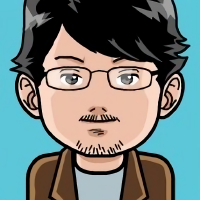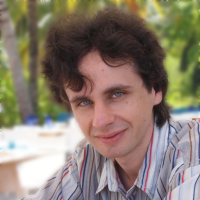00:00:18.240
Well, welcome to my talk! It's called "TDD for Your Soul," subtitled, as you can read, "Virtue and Software Engineering."
00:00:23.599
TDD, just for those of you who weren't sure what that meant, is an acronym for Test-Driven Development.
00:00:28.679
Sure, most of you know that already, but Test-Driven Development is an approach to writing software.
00:00:35.120
A lot of people find it beneficial; I like it myself. It helps in a lot of ways in your process.
00:00:42.360
What I'm doing in this talk is considering what it could mean to apply that process to ourselves as people.
00:00:49.440
Ultimately, we want to not just become better at coding or at engineering, but to be better human beings. That's where we're headed.
00:01:01.399
If you're in this room expecting something else, it's too late because the doors are locked, so you're stuck with me.
00:01:07.479
Hopefully, you can pick up something along the way, even if that’s the case.
00:01:14.600
Like I said, TDD is this process of Test-Driven Development, which is usually shorthand for saying something like 'red, green, refactor.'
00:01:22.240
So, 'red' means writing a test specifying some behavior, and because you haven't implemented the code to make that behavior happen, that test is going to fail.
00:01:30.439
That’s the 'red' piece—where the test is failing.
00:01:35.920
The next piece is getting that test to go green, meaning that you write the implementation needed to make that test pass.
00:01:44.159
The third piece, often forgotten, is refactoring.
00:01:49.680
Now that you have a test that locks in the desired behavior, you can feel free to refactor.
00:01:54.960
You can rename, modularize, or do whatever you need to improve your code, and that test should still pass.
00:02:05.640
So, you feel free to do that, and then you just repeat the process again, starting with 'red'—writing a new test.
00:02:12.560
That’s the process of TDD.
00:02:18.200
I started thinking about applying this process to ourselves because I don’t think you can really argue that science itself—
00:02:26.920
the process of discovery, learning, and inquiry—does not necessarily lead to virtue.
00:02:34.000
Technologists, you know, people who are on the cutting edge of engineering, are not necessarily good people.
00:02:39.879
They are not virtuous just because they know how to do certain things.
00:02:46.440
An excellent example to illustrate my point is Walter White from Breaking Bad.
00:02:51.560
I see you're familiar; it’s a popular show. You should watch it if you haven't.
00:02:57.879
The premise is that Walter White, a genius chemist, is initially a high school teacher.
00:03:03.000
However, he uses his abilities for ill by cooking meth.
00:03:09.200
How could one think of anything worse? He becomes a meth kingpin, using his brilliant mind and capacity for science and engineering.
00:03:14.959
He does not use it virtuously.
00:03:20.360
Just so you know where I stand, I am not someone who entered the software engineering field with all these ideals.
00:03:26.720
I got into software engineering to get paid. I just wanted to make money.
00:03:32.959
I aspired to have indulgent luxuries, such as a goblet filled with olives or dogs playing poker in my living room.
00:03:39.080
That's what I was aiming for—surrounded by bodyguards, just in case.
00:03:45.599
However, throughout my journey as an engineer, I started to realize that there's an opportunity for me to do more than just make money.
00:03:51.079
I recognized the chance to embrace a journey, to work on my vulnerabilities and flaws, and strive to become the best person I can be.
00:04:05.319
If you’re anything like me, you will resist a process like this because I did, and I still do, even as I try to undergo it.
00:04:11.439
To inject a little energy in here since we're all friends, I’m going to try something.
00:04:19.359
I know you’re usually half on your phone and half paying attention at tech conferences.
00:04:25.479
I want you to help me verbalize this natural tendency to resist thinking about our character, our virtue, and who we are as people.
00:04:40.320
When I found myself in this situation, I would say to myself, 'But Abraham, I just want to code!'
00:04:47.720
Let's try that together! But Abraham, I just want to code!
00:04:53.000
This phrase verbalizes what you're already thinking: you don’t want to deal with this stuff.
00:05:01.880
When I call on you, I want you to say that back to me.
00:05:07.560
One more time, together: But Abraham, I just want to code! Any animosity you have towards me, just channel into that phrase, and we’ll be good to go.
00:05:16.280
Let’s consider what virtues could mean for software engineering and for ourselves.
00:05:22.080
The four classical virtues we’re going to use as a framework are self-control, courage, justice, and wisdom.
00:05:27.560
Self-control, courage, justice, wisdom—that's what we're going to talk about.
00:05:32.960
But I know, deep down, you just want to code.
00:05:38.319
Let’s start with the first virtue, which is self-control.
00:05:44.280
What does self-control have to do with software engineering, you may ask?
00:05:50.880
When I started—learning Ruby, which is known for being friendly and accessible for learners—that's one of the things I love about Ruby.
00:05:58.479
Ruby is expressive, with good documentation and lots of resources.
00:06:04.240
I would sit in Starbucks, working through exercises and puzzles, trying to become an algorithmic thinker.
00:06:09.639
Often, I would hit a stumbling block, like trying to call a method on a nil object.
00:06:16.560
At first, this was disheartening. I would get upset and frustrated—
00:06:22.280
Starbucks was not the best place to struggle alone, by the way.
00:06:29.520
Being new can be lonely, and once you hit a stumbling block, it feels like you might as well take the rest of the day off.
00:06:36.160
My lack of self-control often manifested in those moments.
00:06:41.720
However, when I reflect on self-control, you might not experience the same impatience as I do, but it can be hard.
00:06:56.560
As developers and engineers, it’s difficult to talk about self-control.
00:07:00.560
We often work in environments that seem very indulgent to those outside of our world.
00:07:06.562
My dad worked in the sewers of Chicago; I don’t think he would understand these environments.
00:07:12.080
It’s an interesting discussion about self-control as developers.
00:07:19.320
Or perhaps you can relate to a scene from XKCD that reflects this idea.
00:07:26.000
As engineers, we often want to know the truth and what is right.
00:07:34.040
For many of us, this drive to know leads us to stay up late working on projects, often at the expense of dinner or sleep.
00:07:42.080
This highlights how our lack of self-control can manifest.
00:07:50.919
There’s a relevant scene from the sci-fi classic Dune.
00:07:57.679
I recommend it; look it up.
00:08:03.600
The protagonist, Paul, has superhuman awareness.
00:08:09.799
He describes grasping the present and experiencing the complexities of time.
00:08:17.000
He perceives the massive movement of time complicated by shifting currents.
00:08:24.960
This alarming awareness captures how overwhelming possibilities can feel—especially for someone who is new.
00:08:32.480
You might not know where to start. Test-Driven Development aids in this regard, forcing you to take a path.
00:08:42.680
David Stetl argues that it’s about determining your objectives before jumping into coding.
00:08:49.080
Writing a test—or a specification—forces intentionality and purposefulness in your actions.
00:08:57.079
It limits you in a good way, allowing you to exercise self-control.
00:09:08.880
I found that my resistance to TDD often stems from my struggle with self-control.
00:09:18.639
As you reflect on this, think about how self-control as a developer relates to other areas of your life.
00:09:26.440
My dad narrated a crucial lesson to me through action films: a man must know his limitations.
00:09:34.320
Self-control involves knowing yourself and which desires to follow or resist.
00:09:40.760
Instead of leading our desires, we often let them dominate us.
00:09:48.240
Reflecting on our self-control can illuminate limitations we possess, both as developers and individuals.
00:09:54.839
This reflection encourages growth in both areas.
00:10:03.839
But let's discuss the next virtue—courage.
00:10:09.839
What does courage have to do with engineering and software development?
00:10:16.159
There’s courage in simply being an engineer—being curious and facing problems instead of avoiding them.
00:10:23.120
Some of us get energized by tough situations, where the solution isn't clear yet.
00:10:31.959
I’ve skipped lunch, deep into a project, completely absorbed in the complexity.
00:10:38.000
That’s a rarer moment for me.
00:10:43.560
There’s a courage in tackling problems head-on.
00:10:50.480
Richard Feynman, a Nobel Prize winner in physics, stated that the real joy lies in discovering things.
00:10:58.079
It’s not about accolades but the thrill of discovery and the impact of his work.
00:11:04.240
Next, we should explore courage in the context of pair programming.
00:11:09.200
For those unaware, pair programming involves two developers working at one machine, sharing a keyboard.
00:11:15.760
This pairing often requires courage, yet many resist the idea.
00:11:20.760
How many of you pair program all day?
00:11:27.240
For the rest of you, when it comes up, it’s beneficial.
00:11:33.120
Pair programming is a great learning opportunity.
00:11:39.679
However, when confronted with it, I often try to find a way out.
00:11:47.399
The vulnerability in exposing your thought processes is daunting.
00:11:55.879
You may doubt whether your thinking is sound.
00:12:01.000
With a pull request, you can iron it out beforehand.
00:12:06.159
But in pair programming, it’s live, spontaneous.
00:12:12.160
That causes a lot to resist.
00:12:18.160
Let’s get real: in one of my early projects, I encountered a simple task—to find the mode of an array.
00:12:24.399
I took quite some time, around two hours, and felt proud of my solution.
00:12:31.440
But reflecting on it now, I realize I was proud of how unreadable it was.
00:12:37.760
I thought I knew what was going on, line by line.
00:12:43.120
Later, I saw another solution from a peer, Kevin, who approached it differently.
00:12:50.760
Instead of being inspired, I felt personally challenged.
00:12:57.520
But if I had embraced courage, I could have learned from that and improved.
00:13:05.600
Brené Brown says that courage starts with showing up and letting ourselves be seen.
00:13:12.240
Resisting pair programming or mentorship is missing an opportunity to grow.
00:13:19.000
Engineering is a chance to grow in courage, both as engineers and as people.
00:13:27.160
But let’s talk about another virtue—justice.
00:13:34.560
What does justice mean in coding?
00:13:42.120
Justice is often depicted with Lady Justice as someone blindfolded.
00:13:50.080
This symbolizes impartiality and the balance of scales.
00:13:56.800
Simply put, justice can be defined as giving to each person what they are owed.
00:14:02.680
Expanding that, it's about giving to each person, institution, or community what they are owed.
00:14:10.080
Justice requires a perception of order that informs our societal norms.
00:14:17.760
Michael Sandel from Harvard explains that discussing justice engages us in thinking about the best way to live.
00:14:24.720
While some overlaps exist, different conceptions will arise.
00:14:32.000
Nevertheless, we must write maintainable code—and that is just.
00:14:39.200
Just code is defined by at least two obligations: an obligation to time.
00:14:45.760
When I work on exercises with Ruby, I have no obligation to time when I am playing around.
00:14:52.680
But in a professional setting, the code you write must last and function over time.
00:14:58.760
Over time, requirements change: user expectations or technology advances.
00:15:05.319
That means just code must recognize that things will change.
00:15:12.320
Sandi Metz highlights that design is more about preserving changeability than achieving perfection.
00:15:21.839
This involves naming, organizing, and pulling things into abstractions when appropriate.
00:15:28.480
The reason we engage in this is that our code is dynamic and subject to change.
00:15:35.920
The second obligation is that the code is not just for you; it's for others.
00:15:42.480
Think about your obligations to future developers who will read your code.
00:15:50.960
It’s the most selfish way of thinking—you’ll have to reread your code after six months.
00:15:59.120
You have an obligation to the people coming after you.
00:16:06.080
Writing just code satisfies that obligation.
00:16:13.440
Avoiding unjust code is essential; we don’t want to be in that situation.
00:16:20.000
You’ll find that writing code that is changeable and accessible to others fulfills your obligations to your community.
00:16:28.440
Reflecting on this can help evaluate your life: am I navigating obligations to those around me?
00:16:38.560
This could be a time of growth for you in virtue.
00:16:44.960
The last virtue is wisdom.
00:16:51.360
What does wisdom have to do with coding?
00:16:57.919
Wisdom often comes from reflection.
00:17:03.360
Confucius said we can learn wisdom through three methods: reflection (the noblest), imitation (the easiest), and experience (the bitterest).
00:17:10.960
Reflection for engineers often involves writing, reading, and studying.
00:17:17.560
I hope those working as engineers carve out time for reflection.
00:17:23.320
How many of you make time for reflection? It’s crucial.
00:17:29.920
The second method, imitation, occurs often during pair programming or code reviews.
00:17:36.920
This is an effective way to gain wisdom.
00:17:42.679
The third is through personal experience, which comes with pain and suffering.
00:17:48.640
Many of us pride ourselves on learning through that experience.
00:17:56.440
Confucius illustrates that learning through experience is often the hardest.
00:18:05.840
Uncle Bob mentions design patterns as well-worn solutions to common problems, illustrating how wisdom functions.
00:18:13.920
This demonstrates wisdom: applying learned patterns to avoid past mistakes.
00:18:22.000
So ask yourself: how are you growing in wisdom?
00:18:30.080
What is your plan for growing wisdom, whether through reflection or imitation?
00:18:37.240
Over the years, we’ll gain experience, but we need to be intentional.
00:18:46.720
Who do we want to imitate? Who do we want to be in life?
00:18:52.960
Reflect on your relationships with those who inspire you.
00:19:00.560
These questions arise as we reflect on wisdom in engineering.
00:19:07.440
But Abraham, I just want to code.
00:19:14.600
I know; I understand.
00:19:22.960
Today, we reviewed the four classical virtues: self-control, courage, justice, and wisdom.
00:19:29.920
These can apply to us as engineers and as people.
00:19:36.760
This journey of virtue can be summed up by a few questions: who am I? Who ought I to become? How should I get there?
00:19:45.120
When you think about TDD in your life, test yourself—how can you improve?
00:19:54.120
For myself, I wanted to grow in courage—so I set a goal to ask more questions at work.
00:20:03.000
Initially, I failed at this, but with time, I began to pass by consistently engaging.
00:20:10.800
I surrounded myself with comfortable, knowledgeable peers, asking questions to learn.
00:20:16.840
That’s what I mean by evaluating your soul through TDD.
00:20:23.520
Be brutally honest about your flaws and how to address them.
00:20:30.560
Darth Vader makes me consider a lack of tests in our lives; it’s disturbing.
00:20:36.560
Many people balk at growing in virtue due to shame.
00:20:44.400
Shame contrasts with guilt—it’s an emotion of feeling bad about yourself.
00:20:51.080
This creates an internal narrative: 'You’re not good enough; you won’t succeed.'
00:20:58.360
Shame stops us from embarking on a journey of growth because we fear discomfort.
00:21:06.760
This narrative is pervasive and keeps us from seeking improvements.
00:21:13.839
Criticism can feel like an anchor weighing us down, hindering growth.
00:21:21.680
Yet with the right mindset, criticism can transform into a buoy that lifts us up.
00:21:28.960
Embracing growth opportunities can lead us on an adventure, refining our character.
00:21:35.760
The blues came from the struggle and oppression that generated music.
00:21:44.160
Ralph Ellison describes it as an impulse to keep painful experiences alive.
00:21:50.080
This embraces the painful details and transforms them into lyricism.
00:21:56.560
In making character from our vulnerabilities, we can transcend those experiences.
00:22:05.679
This encourages us not only to become better coders but ultimately better people.
00:22:12.960
I hope this conversation about virtues and TDD resonates with you.
00:22:20.320
You can distribute this journey in your way and reflect on these concepts.
00:22:26.399
If you have questions or critiques, I’d love to hear them.
00:22:32.760
My name is Abraham, and I work at Central in Chicago. We’re hiring, too!
00:22:38.640
I appreciate getting this opportunity to speak to you.
00:22:46.640
Now, I’ll open the floor for any questions you may have.
00:22:52.560
You all just want to code? That’s understandable.
00:22:56.840
Thank you for listening, and thanks for attending!















































































